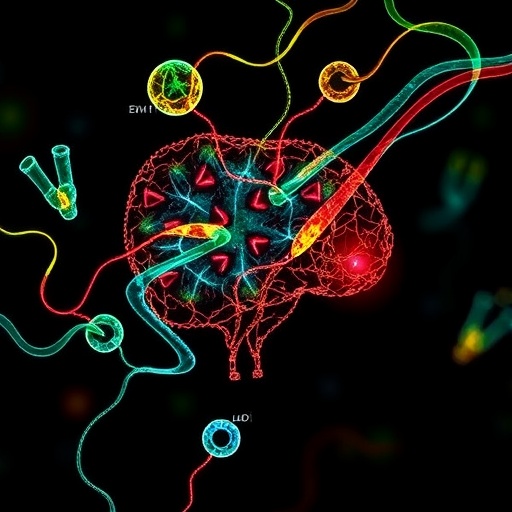The intricate relationship between mitochondrial function and the body’s response to psychosocial stress has long intrigued scientists, owing to its profound implications for metabolic health and disease. In a groundbreaking study published recently in Nature Metabolism, researchers have revealed an unexpected and complex regulatory role of the metabolic hormone fibroblast growth factor 21 (FGF21) in human stress physiology. This revelation emerges from their discovery that acute psychosocial stress exerts opposite effects on circulating FGF21 levels depending on mitochondrial health, thereby linking mitochondrial oxidative phosphorylation (OxPhos) capacity directly to the endocrine response to psychosocial stimuli.
FGF21 has been extensively studied as a pivotal hormone in energy homeostasis, traditionally recognized for its induction during fasting and metabolic stress. It acts as a key mediator in adaptive metabolic processes, including lipid utilization and glucose regulation. Importantly, its expression is also upregulated during mitochondrial dysfunction, which is characteristic of a broad spectrum of mitochondrial diseases (MitoD). However, its precise function concerning acute psychosocial stress—a form of psychological strain mediated by social interactions rather than physical exertion—had remained elusive until now.
The study’s core finding is particularly striking: in healthy individuals, acute psychosocial stress leads to a statistically significant reduction in serum FGF21 levels by approximately 20%. This decrease occurs despite the well-documented fact that psychosocial stress activates a variety of neuroendocrine stress hormones, suggesting a nuanced, perhaps suppressive, regulatory mechanism operating under normal mitochondrial conditions. Contrastingly, individuals afflicted with mitochondrial diseases exhibit a divergent response, with serum FGF21 levels rising by around 32% in response to the same psychosocial stressors.
This diametrically opposing behavior indicates a functional interaction between the body’s stress response pathways and OxPhos capacity—a fundamental component of mitochondrial energy metabolism. Mitochondria are known for orchestrating ATP production through oxidative phosphorylation, a highly regulated process. When mitochondrial function is impaired, cellular energy homeostasis is disrupted, profoundly affecting systemic metabolic signaling. The surge in FGF21 observed in MitoD patients under stress suggests an adaptive mechanism aimed at meeting altered energetic demands or mitigating oxidative stress, reinforcing FGF21’s role as a mitochondrial stress signal.
Further insights from the study stem from analyses of co-activation patterns linking FGF21 and canonical stress-associated neuroendocrine hormones such as cortisol and catecholamines. The researchers identified coordinated fluctuations indicating that FGF21 operates within an integrated hormonal network regulating the body’s response to psychosocial stress. This places FGF21 alongside classical stress hormones, expanding our understanding of the endocrine landscape modulating psychological and metabolic resilience.
Beyond hormonal measurements, the research team explored associations between FGF21 concentrations and psychosocial factors related to stress and wellbeing, uncovering potential predictive markers with clinical implications. These links outline a broader biopsychosocial axis in which mitochondrial health and psychological stress converge, highlighting FGF21 as a possible mediator in this interplay. Such discoveries pave the way for novel diagnostic or therapeutic strategies targeting FGF21 signaling to enhance stress adaptation and metabolic health in patients with mitochondrial dysfunction.
The implications of these findings extend beyond rare mitochondrial diseases, touching upon common disorders where stress and metabolic dysregulation are intertwined, including diabetes, obesity, depression, and neurodegenerative conditions. By elucidating the endocrine adaptations to psychosocial stress conditioned by mitochondrial capacity, the study offers a conceptual framework for understanding how cellular bioenergetics can influence systemic physiology and psychological health.
Importantly, the methodology employed by the researchers emphasizes the precision and robustness of their findings. The study leveraged serum biomarker quantification in well-characterized cohorts undergoing standardized acute psychosocial stress paradigms, ensuring the observed hormone fluctuations accurately reflect physiological responses. Such rigor enhances confidence in the claim that FGF21 is not merely a passive marker of mitochondrial distress, but an active participant in orchestrating stress-related metabolic outcomes.
Moreover, the bidirectional modulation of FGF21 suggests potential feedback mechanisms that might regulate mitochondrial and systemic energy balance differently in healthy versus diseased states. This complexity underlines the need for further mechanistic investigations into how psychological stress signals are transduced into metabolic responses at the molecular level, particularly focusing on the cross-talk between mitochondria, endocrine tissues, and the central nervous system.
The study also raises intriguing questions regarding the evolutionary significance of FGF21’s dualistic regulation during psychosocial stress. From a survival perspective, adjusting metabolic signaling according to mitochondrial functionality could represent a refined strategy to conserve energy or facilitate recovery under adverse conditions. This nuanced regulatory system may therefore be part of a conserved biological network ensuring organismal adaptation to fluctuating social and environmental demands.
Clinically, the identification of FGF21 as a stress-responsive hormone with divergent responses dependent on mitochondrial status holds promise for personalized medicine approaches. It provides a biomarker that might enable clinicians to better monitor stress resilience and metabolic health, tailoring interventions for individuals with mitochondrial pathologies or those experiencing chronic psychosocial stress with metabolic consequences.
In summary, this seminal study fundamentally reframes our understanding of FGF21 not just as a metabolic hormone responsive to nutritional and mitochondrial stress, but as an integral component of the human neuroendocrine response to psychosocial stress. The discovery that mitochondrial capacity dictates the direction of FGF21 regulation amplifies the hormone’s role as a molecular nexus at the convergence of metabolism, stress, and mitochondrial biology. As research continues, targeting FGF21 signaling pathways may emerge as a novel therapeutic avenue to enhance metabolic and psychological health in diverse populations, unlocking new potentials in stress medicine.
The landscape of mitochondrial medicine is enriched by these findings, which energize future explorations of how modulating mitochondrial function and associated hormonal networks can influence human health and disease resilience. This multidisciplinary advance bridges metabolic physiology, neuroendocrine science, and psychosocial health, promising a deeper understanding of the fundamental pathways that sustain life under stress.
Subject of Research: Metabolic regulation of FGF21 in relation to mitochondrial oxidative phosphorylation defects and psychosocial stress in humans.
Article Title: Mitochondrial and psychosocial stress-related regulation of FGF21 in humans.
Article References:
Kurade, M., Bobba-Alves, N., Kelly, C. et al. Mitochondrial and psychosocial stress-related regulation of FGF21 in humans. Nat Metab (2025). https://doi.org/10.1038/s42255-025-01388-6
Image Credits: AI Generated




